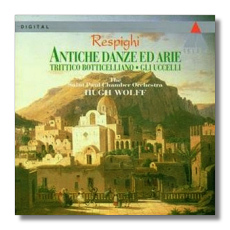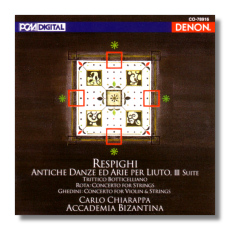
The Internet's Premier Classical Music Source
Related Links
- Respighi Reviews
- Latest Reviews
- More Reviews
-
By Composer
-
Collections
DVD & Blu-ray
Books
Concert Reviews
Articles/Interviews
Software
Audio
Search Amazon
Recommended Links
Site News
 CD Review
CD Review
Ottorino Respighi

Ancient Airs and Dances
Trittico Botticelliano
- Botticelli Pictures
- Ancient Airs and Dances I & III
- The Birds
St. Paul Chamber Orchestra/Hugh Wolff
Teldec 91729 (Elektra) 70min


- Ottorino Respighi:
- Botticelli Pictures
- Ancient Airs and Dances III
- Giorgio Federico Ghedini: Violin Concerto
- Nino Rota: Concerto for Strings
Accademia Bizantina/Carlo Chiarappa
Denon 78916 (Allegro) 70min
Arved Ashby praised the Orpheus Chamber Orchestra's all-Respighi disc quite highly in the March/April 1994 American Record Guide. As fine as that earlier effort certainly was, this new recording of the same program by the St. Paul Chamber Orchestra is even more delightful and charming, due in large part to the impeccable leadership of Hugh Wolff. His considerable skill as a colorist is evident immediately when the glorious sound of the shimmering strings at the outset of the Boticelli Pictures emerges from your speakers. Wolff's generally relaxed, unhurried pacing lends a magical, timeless quality to the slow movements of the two Ancient Airs and Dances suites and especially the 'Adoration of the Magi' from Boticelli, which has never before sounded quite as touching or exotic. Teldec's helpful booklet includes black and white photos of all three Boticelli paintings.
Gentle humor and gracious warmth characterize Wolff's version of The Birds. If my spirit ever needs a lift, all I need do is listen to the first 60 seconds of V, which is one of the most enthralling and beautiful musical experiences ever captured on disc. The joyous enthusiasm and seductive playing of the St. Paul band makes their versions of the two Ancient Airs and Dances suites exceptional. The lovely vocal quality of the string ensemble in Suite III serves to remind us that these ancient melodies were indeed "airs" as well as "dances". The St. Paul Chamber Orchestra is truly an ensemble of virtuosos, and Teldec's utterly transparent recording captures every minute detail of their playing with perfect fidelity. This is one of the most completely satisfying releases I've heard in years. Now Teldec, how long must we wait before you get these artists back in the studio to record the secondAirs and Dances Suite?
After spending more than an hour with the gifted St. Paul ensemble, the Accademia Bizantina sounds terribly amateurish by comparison. While this group does boast some fine wind players, they are heard only in the Boticelli Pictures. The Accademia's strings, on the other hand, simply do not measure up. Their tone is thin and nasal, and their intonation is far too often suspect. Chiarappa - who also serves as a somewhat raspy violin soloist in the Ghedini Concerto - does on occasion have interesting interpretive ideas. Certainly his expansive pace in II of Ancient Airs III (over one minute slower than the already languorous Wolff) conveys the calm tranquility of this music very well. Still, more energy in the faster sections of this movement would have offered a welcome and much-needed contrast. The remaining works on the Denon disc are disappointing and unlikely to appeal to those who purchase it for the two popular Respighi selections. While there is some expressive slow music in the finale of the Ghedini, the remainder of his 1947 concerto consists of little more than busy, twittering nonsense. The suite by film composer Nino Rota is considerably more accessible, but its cloying themes and echoes of Shostakovich soon become tiresome. Denon's sound is artificial and hollow at best. Pass on this one, and save your money for Hugh Wolff's resplendent Teldec recording.
Copyright © 1998, Tom Godell


















